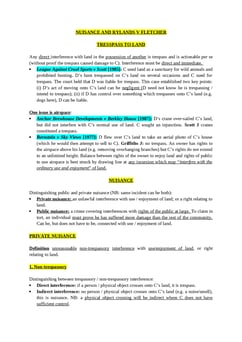Haley v London Electricity Board [1965] AC 778
Judgement for the case Haley v London Electricity Board
Table Of Contents
KEY POINTS
Common knowledge must be used when determining what is reasonably foreseeable. It is reasonable to expect a blind person to walk down the pavement. It is the responsibility of the Board to take reasonable precautions not to endanger other people who may reasonably be expected to walk down the pavement; this obligation applies to both people with disabilities and able-bodied people.
Again, common knowledge must be considered when determining what constitutes effective protection. You must take reasonable precautions to avoid acts or omissions that you can reasonably predict will hurt the infirm or blind.
Obligation to contemplate all reasonable circumstances and ensure that the duty of care is owed, in any situation where liability of negligence may exist, is the work of the board/individual in charge of the work being done.
FACTS
The appellant, a blind man who used his white cane to navigate any impediments, had a habit of going alone from his house to the bus stop along the pavement.
Unbeknownst to the appellant, the Respondent Board had dug up a portion of the pavement one morning. Instead of a fence, the workers placed a punner (a long stick with a weight attached to one end) as an obstruction near the trench.
The appellant approached the punner, moving his cane around properly to check for obstructions, but he missed the punner as it was too low and his cane did not make contact with it, leading the appellant to fall over and hit his head against the pavement. He went deaf as a result of the fall.
The appellant filed a suit for negligence against the respondent. However, the respondents contended that they had not violated their duty of care because they had taken reasonable precautions to ensure the safety of any sighted pedestrian.
The contention here was whether the criteria of reasonable foresight extend only to people of ordinary health or does it take into account special circumstances or infirmities.
COMMENTARY
It was held that the workers failed to perform their duties adequately, because, if they had used the portable fences, there would have been a barrier of over two feet high right across the pavement instead of a sloping stick just a few inches over the ground where the appellant fell over.
The streets of any city, can be used by people with impaired vision, hearing, or capacity. It is the workers that have to reasonably foresee the adequate protection required, but if they are negligent, they cannot escape the penalties by claiming that they had not foreseen a blind man walking along the pavement, in one of the most populous parts of London.
Thus, it was held that the obligation of those responsible for the safety of the roads and pavements is not just restricted to people with normal sight, rather, it extends to all road users, including the blind and others.
ORIGINAL ANALYSIS
R was digging up a pavement and laid a punner-hammer across the entrance to that section to prevent people walking onto that section of the pavement. A blind man walked onto that area, having missed the punner hammer and fell, leaving him deaf.
HL said that R had a duty of care to all pedestrians to warn them about going onto the area, including blind pedestrians.
R would have been entitled to assume that a blind person would take reasonable care of themselves, e.g. by using a stick (i.e. if they had put up a proper barrier that the stick would touch then they would have discharged their responsibilities).
Lord Reid
In determining what is reasonably foreseeable, some “common knowledge” has to be assumed, e.g. that blind people exist and walk on pavements (even if R did not foresee a blind person walking along at the brief period where the pavement was left dug up).
For Further Study on Haley v London Electricity Board
Need instant answers? Our AI exam tutor is here to help.
Ask questions 🙋 Get answers 📔 It's simple 👁️👄👁️
Our AI is educated by the highest scoring students across all subjects and schools. Join hundreds of your peers today.
Get StartedSimilar Cases
Related Product Samples
These product samples contain the same concepts we cover in this case.

 Since 2010, Oxbridge Notes has been a trusted education marketplace, supplying high-quality materials from top achievers at universities like Oxford, Cambridge, LSE, Harvard, and Yale.
Since 2010, Oxbridge Notes has been a trusted education marketplace, supplying high-quality materials from top achievers at universities like Oxford, Cambridge, LSE, Harvard, and Yale.